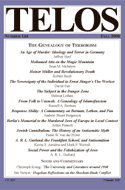As an occasional feature on TELOSscope, we highlight a past Telos article whose critical insights continue to illuminate our thinking and challenge our assumptions. Today, Katherine McGinity looks at Jim Vernon’s “American Antigone: Hegelian Reflections on the Sheehan-Bush Conflict,” from Telos 144 (Fall 2008).
 With the departure of the last American troops from Iraq, we can shift our perspective on the war from current event to one of history. Jim Vernon’s 2008 article “American Antigone: Hegelian Reflections on the Sheehan-Bush Conflict” was written in the midst of the war and just as Cindy Sheehan was moving herself out of the public eye. Now is an interesting time to revisit the dramatic conflict that ensued between Sheehan and George W. Bush and the ideological camps that formed around them.
With the departure of the last American troops from Iraq, we can shift our perspective on the war from current event to one of history. Jim Vernon’s 2008 article “American Antigone: Hegelian Reflections on the Sheehan-Bush Conflict” was written in the midst of the war and just as Cindy Sheehan was moving herself out of the public eye. Now is an interesting time to revisit the dramatic conflict that ensued between Sheehan and George W. Bush and the ideological camps that formed around them.
Vernon looks to Hegel’s analysis of Sophocles’ Antigone in order to gain a deeper understanding of the Sheehan-Bush conflict. In Hegel’s Phenomenology of Spirit, the tragic play is broken down in terms of the character’s ethical alignment. Antigone represents the divine law of familial duty, and her uncle Creon undertakes the laws that govern the well-being of the state. According to Hegel, the tragedy that follows is due to the fact that each character’s convictions are equally balanced in terms of ethical validity. This type of conflict arises through what Hegel describes as “immediate Spirit”:
Hegel’s analysis of “Spirit” articulates the historical development of the relations between individuals and their community. Hegel begins by examining the least developed, most immediate form that this relationship could take, i.e., that wherein all citizens immediately identify with their community. In “immediate Spirit,” each “individual [simply] is [their] world,” i.e., each counts as self-conscious (for both themselves and others) only through determinate identification with the universal, communal substance. While Hegel identifies this ethical relation with the Greek polis, we must grasp how American democracy, from its highly complex state, regressed to this form.
Sheehan and Bush serve as foils to this ancient familial/political conflict. In addition to their attachment to incompatible sets of beliefs surrounding war, the two players in this modern conflict fall into gender roles consistent with Hegel’s statement that “the two ethical powers [i.e., laws] . . . actualize themselves in the two sexes” (Phenomenology of Spirit, 465). Vernon points out that while Antigone and Sheehan both fall on the familial side of the ethical struggle, and Creon and Bush on the other, these alignments need not be firmly attached to gender roles.
Admittedly, the patriarchal association of the sexes with their particular laws remains one of the least-defended (and, if read as an account of their “ethical natures,” defensible) points in all of Hegel. However, if it is read as an account of social symbolization, we can appeal to mainstream political discourse as it manifests itself historically. On this reading, it is not accidental, for example, that Michael Moore dedicated much of his anti-Bush film to a grieving mother, or that “Fort Qualls,” the “patriotic” camp erected by pro-Bush forces in reaction Camp Casey, was led by the father of a fallen soldier. While there is no necessity in individuals of either sex choosing either law, social representation of the conflict tends to follow the division between “woman/divine” and “man/human.” Hegel’s account, then, can be read not so much an apology for patriarchal culture but as an account of how a patriarchal interpretation of the natural difference between the sexes comes to dominate the ethical self-representation of the community.
Vernon posits that the Sheehan/Bush conflict arose when America became divided into two “social groups that lack(ed) full consciousness of the effects of their actions.” The American government took actions to provide security to its citizens from acts of terror and to continue to provide access to cheap oil, both of which provide for the existence and standard of living required within the American economy. To many Americans, acts of war to achieve the self-preservation of life in the United States was not worth the human cost involved, and Cindy Sheehan, the morally entitled mother of a fallen solider, became the “face” of this movement. Bush became a symbol of the “cocksure masculinity” that surrounded other side of this clash.
To close, Vernon looks again to Hegel for a method that overcomes this type of ideological bifurcation of the immediate Spirit. This begins with a recognition that “each side is as guilty as the other of breaking and condemning a law that it unconsciously validates.” In order to fully grasp the situation, the author advocates for full recognition of the demands placed on governmental policy as well as an understanding that elimination of extreme security measures may increase the likelihood terrorist acts. Vernon argues that only when we have admitted our hand in defining the divine law that shapes the government’s actions, we can we avoid wars for the security and resources we demand.
Vernon’s final point is especially interesting and can elicit the reader’s reflection well beyond the Sheehan/Bush conflict, providing a framework for reconsidering any community’s relationship to their government and the demands they place on each other.
Read the full version of Jim Vernon’s “American Antigone: Hegelian Reflections on the Sheehan-Bush Conflict” at the Telos Online website. If you are affiliated with an institution that is an online subscriber to Telos, you have free access to our complete online archive. If not, you can purchase 24-hour access to this and other Telos articles at a per-article rate. Follow the article link for more details.








